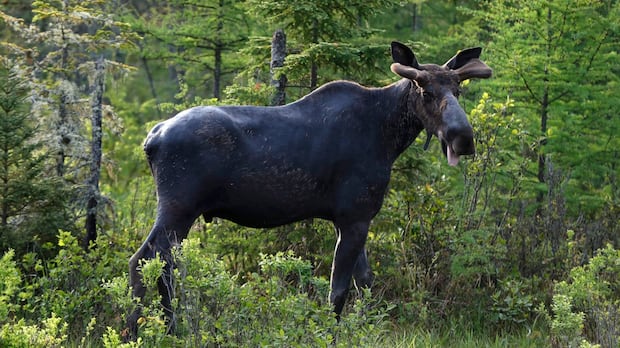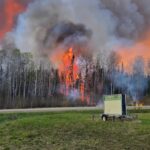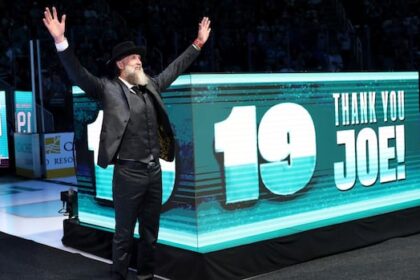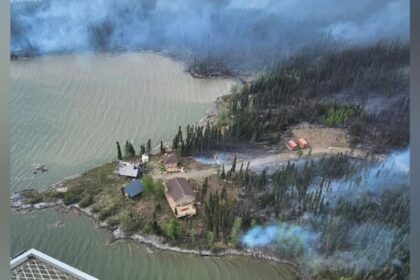ManitobaA long-awaited court decision over how the Manitoba government regulates moose hunting in a First Nation’s traditional territory has culminated with a judge tossing two legal challenges against the province.’Ultimate question’ of whether province violated Pimicikamak’s treaty rights remains after decision: lawyerOzten Shebahkeget · CBC News · Posted: Oct 23, 2025 6:00 AM EDT | Last Updated: 4 hours agoPimicikamak Cree Nation and the Manitoba Wildlife Federation launched legal challenges against the province’s cut to moose licences in parts of northern Manitoba last year. A judge tossed both court actions this month. (Robert F. Bukaty/The Associated Press)A long-awaited court decision over how the Manitoba government regulates moose hunting in a First Nation’s traditional territory has culminated with a judge tossing two legal challenges against the province.In July 2024, Jamie Moses, then the province’s minister of natural resources, sparked criticism after he slashed the number of moose draw hunting licences for residents by 75 per cent — from 400 to 100 — across four of Manitoba’s 62 game hunting areas.Pimicikamak Cree Nation and the Manitoba Wildlife Federation — a conservation organization that advocates for the interests of hunters — both filed legal challenges to the decision. Arguments were heard in Court of King’s Bench during a two-day hearing in November 2024.Pimicikamak argued the decision was unreasonable, because it did not prevent issuing moose licences for non-Indigenous hunters on its traditional territory, while the wildlife federation argued it was unreasonable because it cut the number of available licences.The province asked the court to dismiss both applications for judicial review.In a written decision dated Oct. 9 and made public on Monday, Justice Brian Bowman tossed both applications, saying Moses’s decision was justifiable given the data the province had at the time.Pimicikamak argued the licensing decision did not meet the Crown’s legal obligation to consult and, where appropriate, accommodate Indigenous people before making decisions that may infringe on Aboriginal and treaty rights.Pimicikamak also claimed the decision infringed on its rights under provincial laws, Treaty 5 and the Northern Flood Agreement. That agreement, signed in 1977 between a group of northern Manitoba First Nations, the federal and provincial governments, and Manitoba Hydro, states Manitoba must prioritize Indigenous harvesters on Pimicikamak’s traditional territory.Bowman’s decision said between April and June 2024, Moses met with members of Pimicikamak and Manitoba Keewatinowi Okimakanak, a northern First Nations advocacy organization, to hear their concerns about moose licences related to food security and conservation. He ruled that the province “adequately discharged” the Crown’s duty to consult, and the province’s licensing cut last year “clearly accommodated” Pimicikamak’s concerns.’Reasonable and rational, but imperfect’The wildlife federation argued Moses’s licensing cut was “unprincipled, arbitrary and irrational,” saying it was based on Pimicikamak’s “anecdotal evidence” and not on any new information, according to Bowman’s decision.”However, the underlying honour of the Crown allows Manitoba the discretion to accommodate the asserted interests of the First Nation,” the judge wrote.Bowman also said that the Wildlife Act allows the minister of natural resources “to make adjustments to account for information/concerns brought forward by stakeholders” when issuing licences.Case law has shown that while such a decision may have been flawed given the quality and quantity of available information at the time, it would be “inappropriate for the court to act as an ‘academy of science’ to decide whose scientific view is correct,” he wrote.”In this context, given the grave concerns that were raised by Aboriginal communities regarding declining moose populations, the decision was reasonable and rational, but imperfect.”Bowman also ruled Pimicikamak’s claims that Moses’s licensing decision infringed on its Aboriginal and treaty rights cannot be determined through an application for a judicial review, as they require “a full discovery process and must be made by way of a statement of claim.”Pimicikamak’s application is “not the proper forum in which to make a determination of the existence or scope of Aboriginal or treaty rights, nor is it the proper forum to determine whether the asserted treaty rights have been unjustifiably infringed,” Bowman wrote.He said that many of the issues that Pimicikamak raised in court arise directly from the Northern Flood Agreement, which has a dispute resolution process that can include arbitration. Such matters “should be heard by an arbitrator” under the agreement’s process, Bowman said.Precedent-setting case: lawyerThe decision appears to be precedent-setting in Manitoba, as a judge has never handled a case where a First Nation sought a judicial review for alleged breaches of its Aboriginal and treaty rights, according to lawyer Byron Williams, who represented Pimicikamak in the case.Pimicikamak sees the ruling as a procedural one, not a substantive one, because Bowman did not decide whether or not the First Nation’s rights were violated by Moses’s licensing decision, Williams said.”The ultimate question has not been decided,” he told CBC News on Wednesday.Pimicikamak is currently deciding how to proceed, he said.”One [option] is to proceed to trial. Another one is to proceed before an arbitrator under the Northern Flood Agreement, and the third is to appeal,” he said.”From Pimicikamak’s perspective, Manitoba is not protecting those moose [or] keeping its promises, so they’re back where they were a year ago, trying to figure out the quickest way to protect these populations and to protect their rights.”The Manitoba Wildlife Federation will appeal Bowman’s decision, said senior policy adviser Chris Heald, who argued the province continues to “erode public access to public lands with last-minute decisions made without scientific justification and behind closed doors.”ABOUT THE AUTHORÖzten Shebahkeget is a member of Northwest Angle 33 First Nation who grew up in Winnipeg’s North End. She has been writing for CBC Manitoba since 2022. She holds an undergraduate degree in English literature and a master’s in writing.Email: ozten.shebahkeget@cbc.ca
Wednesday, 4 Feb 2026
Canada – The Illusion
Search
Have an existing account?
Sign In
© 2022 Foxiz News Network. Ruby Design Company. All Rights Reserved.
You May also Like
- More News:
- history
- Standing Bear Network
- John Gonzalez
- ᐊᔭᐦᑊ ayahp — It happened
- Creation
- Beneath the Water
- Olympic gold medal
- Jim Thorpe
- type O blood
- the bringer of life
- Raven
- Wás’agi
- NoiseCat
- 'Sugarcane'
- The rivers still sing
- ᑲᓂᐸᐏᐟ ᒪᐢᑿ
- ᐅᑳᐤ okâw — We remember
- ᐊᓂᓈᐯᐃᐧᐣ aninâpêwin — Truth
- This is what it means to be human.
- Nokoma











